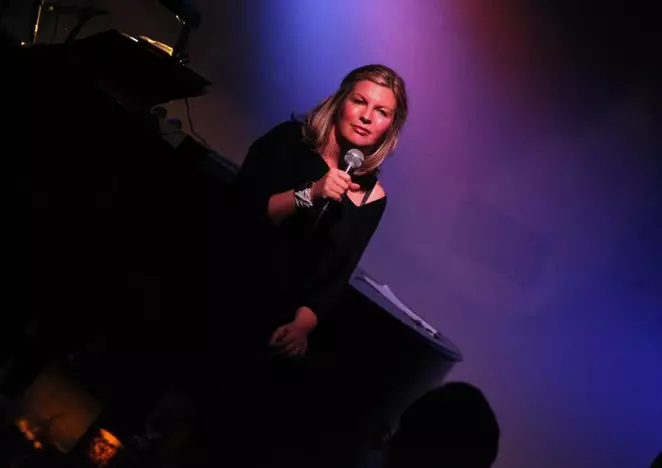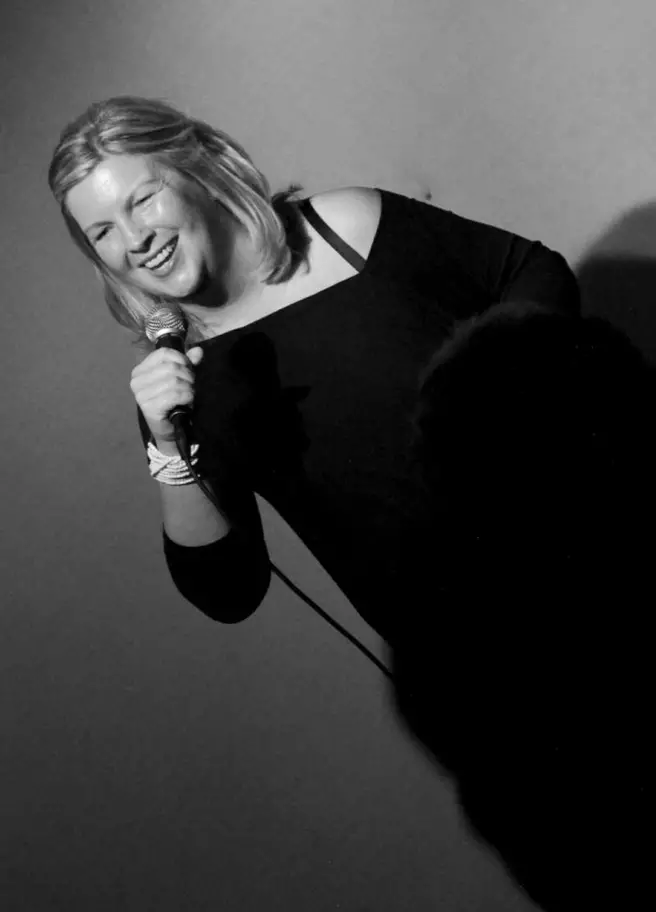by Stephen Mosher Feb. 6, 2020

It is apropos that Susanne Mack mentions, in her opening monologue, that she is German, and that one of her songs includes the name of the legendary Marlene Dietrich because Misses Mack and Dietrich share many of the same qualities as performers. It isn’t the German thing, though one may assume that both women were raised with certain mindsets and traditions typical to the Germanic culture, but that which both women, most notably, have in common: their status as cabaret artists. Legendary are the tales of Marlene Dietrich‘s early work in cabaret rooms before she became famous, and even after fame, Dietrich continued to sing in supper clubs a little swankier than those in which she could be found during her youth. Dietrich was a consummate performer in the cabaret style, and whether it is something that is taught, something that’s assimilated, or something in the water in Germany, Susanne Mack is equally as proficient at the art of cabaret – to that end, one might call her a modern-day Marlene Dietrich. No, Susanne Mack does not stand on a stage in a beaded sheath and a fur, she is a modern and she wears clothing comfortable enough to hang out in when spending an hour singing and telling stories.
And, boy, can Susanne Mack tell stories.
WHERE I BELONG is Ms. Mack’s latest show and she has been performing the act around town for a while – it just took this writer a few tries to get the evening scheduled, and the wait was worth it. Having moved uptown from Pangea to Don’t Tell Mama, Mack had The Brick Room almost completely sold out last night, and the show she is presenting is an enchanting example of what cabaret can be when it is approached from an authentic place inside of the artist, and a constructive guiding hand from their team. Ms. Mack has chosen to tell stories about her life, ranging from her childhood in Germany to her more recent years as an American citizen living in New York. The topics of these stories range from events in her youth as simple as standing on a white line, to occasions in her adulthood as deep as bonding with two young boys at odds, about the mere fact of being human, and not one word in one of these stories is misplaced. Susanne Mack has written a script that plays like a memoir and we, her audience, are having the extreme pleasure of being in the room on the day that she records the audiobook version. Her conversation with her audience is real, frank, touching, and so intelligent – and it’s really working for her. To hear Susanne Mack talk is to learn what it is to hang on someone’s every word – it’s pure poetry in a German accent, and you never want it to stop. Whether Mack is speaking her truth or singing it with one of the most interesting collections of songs used to design a cabaret show, she finds a way to say the things we have all felt, thought, and experienced, creating solidarity with a room filled with forty people.
Musically, Where I Belong is a wonderful way to spend an hour because, as much as this guy likes show music and standards, a night of rock songs is always a welcome show in a cabaret. With songs penned by Tom Waits, Paul Simon, David Bowie and Lennon/McCartney, a singer can’t go wrong, even if they aren’t onstage with a full band – and there are times when Musical Director/arranger Paul Greenwood SOUNDS like a full band, so it’s a musical match that pays off for both the artist and her audience. Ms. Mack’s roots are showing, here, and not just the German ones (though there are delicious moments during which she sings in her native language) because when she applies her song choices to her stories, she does it with such conscientious intent that it becomes clear that these songs are as old friends to her, that they may even have been a part of her life at the exact moment that the stories being relayed were taking place. And the joy, oh, the enraptured joy to be witnessed during “Gotta Be” or “We Belong” is enough to send anyone out into the cold night, warmed and with a smile. Of course, it is natural that Mack’s joy be visible, since every emotion she has during the hour-long performance simply rolls over her face as she awaits the next lyric. Entirely without nerves of any kind, Susanne Mack is content to be one with the music as the audience watches her reverie in song, and that goes a long way toward making Where I Belong a successful night of theater.
Another factor in the success of the show is Mack’s voice itself. It’s a pretty enough voice, but it’s more than just being pretty – anyone can have a pretty voice. What Susanne Mack has is more important: she has an interesting voice. With a unique timbre that establishes it as being solely Susanne Mack’s voice, it rises above the quality of just being pretty. With certain limitations, the Mack voice will not be held back, gently insisting on being heard and on being observed, and the stories musical and verbal float forward and outward into the night like magical fireflies, lit up with the energy of soulful, honest artistic creation. If she were in a Looney Tunes cartoon, when Susanne Mack began to sing, all the people around her would see, instead of her corporal being, a heart floating in the air before them. That’s definitely more than your average run-of-the-mill pretty singing voice. Susanne Mack is an original.
Susanne Mack is also a professional. Last night at Don’t Tell Mama, there were some unexpected technical difficulties. They happen. It’s a fact of life. When it happens, you can either let it spook you, or you can keep going. When the last shoe falls, you should be able to do your show without props, costumes, or lighting, in a living room, a library or a parking lot, and when the light grid went out, leaving Mack in the dark and Tech Director Adam DeCarlo scrambling to get them back on, Susanne didn’t panic. She continued in the dark for a moment and then she did what any savvy performer would do: she moved her stool into the one light on the stage and kept going. Her directors, Tanya Moberly and Barb Junger, have guided her well, letting her know she can set her own rules and control her own show, that she is not locked into any blocking or any set concept, and that when something goes awry, it’s her face out front and she needs to keep it in the light. It’s a teachable moment because some of the lighting designers in some of the clubs have a penchant for mood lighting, leaving singers singing in the dark, while their audiences squint to get a good look at them. Performers need to know that it is their right to be seen while onstage and their right to ask for more light, while their directors should have their backs and make sure that the talent is not, in fact, working on a stage with barely enough light for their much-needed facial expressions to be seen. Last night at Don’t Tell Mama Adam and Susanne both made sure she wasn’t in the dark, and that’s two industry professionals doing their jobs for a grateful and understanding audience.
Where I Belong is, ultimately, a bit of a mystery for Mack, which is probably why she chose the title in the first place. Discussing her pleasant but conflicting trips home to Germany, pondering her love of New York and her distaste for slow-moving tourists, it would seem that Susanne Mack belongs in both places at different times in her life — not an unusual sensation for many people who have lives that are spread out. The fact of the matter, though, as she so eloquently illustrates with a well chosen number sung directly to her husband, is that where she belongs is wherever he is — and, there, life is right as rain.
Oh, and on a cabaret stage. Yes, Susanne Mack definitely belongs on a cabaret stage, and when she is, things are just right, too.






